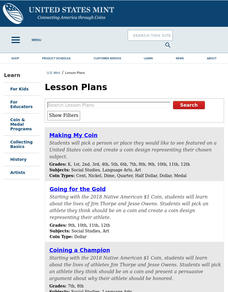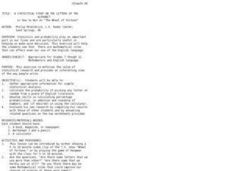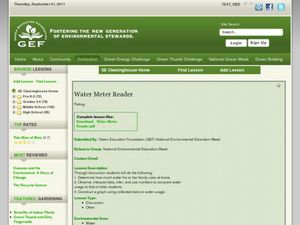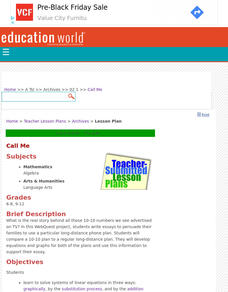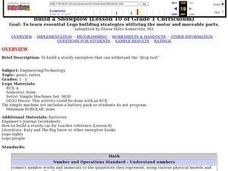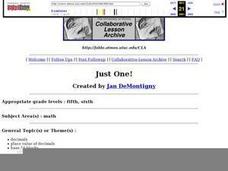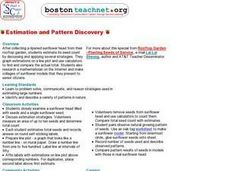Curated OER
Odd Is In
Pupils play a game with coins and then use reasoning skills to develop a strategy for winning the game.
Curated OER
Modeling Forest Fires Using Probability
High schoolers explore forestry. They discuss creating fire breaks to control forest fires. Students create models to determine the best way to manage forest fires. They discuss current techniques of forest management.
Curated OER
Charting Attendance Rate of Busch Gardens
Sixth graders, in groups, are given different parts of the whole project. They use information from Busch Gardens to explore line graphs, averages, and other math vocabulary.
Curated OER
A Statistical Study on the Letters of the Alphabet
Students use a book or magazine to research the use of letters. They complete a worksheet and compare their results.
Curated OER
Different Audiences
Students examine levels of language difficulty for different audiences. They explore how to simplify texts to suit a younger audience. Students use a thesaurus to find synonyms. Students select a news article to rewrite. They create...
Curated OER
Water Meter Reader
Students examine a water bill from their household and examine it to find out how much water is used each month. They read their home water meters at the same time of the day for seven days and then construct a graph using their data.
Curated OER
Base 3
Students investigate this problem that aims to give a better idea of our decimal system by looking at a comparable system - the base 3 system. By seeing how base 3 numbers work students should have a better appreciation of base 10...
Curated OER
Roman Toothpicks
Second graders make a chart comparing Roman numerals and our number system using toothpicks and construction paper. This clever lesson has students use toothpicks to create Roman Numeral translations for standard numbers.
Curated OER
Piece of the Sky: Introduction for Making S'COOL Observations
Students observe and discuss cloud cover. They identify percent of cloud cover, calculate cloud cover by fraction and convert to a percent, and compare their models with the current real sky cloud cover.
Curated OER
Call Me
Pupils write essays to persuade their families to use a particular long-distance phone plan. They compare a 10-10 plan to a regular long-distance plan.
Curated OER
Fraction King Lesson Plan
Students combine imagination, block manipulation, and computer applets to investigate fractions.
Curated OER
Decimals: Tenths
In this math worksheet, students convert the fractions to decimals. They also practice converting decimals into fractions or mixed numbers.
Curated OER
Build a Snowplow
Students design and build a snowplow using LEGO materials. They compete in an Engineer's Challenge to clear a path through Styrofoam peanuts.
Curated OER
Just One!
Students play a trading game using Base 10 blocks that incorporates decimal place value. Then they each receive a paper with a decimal number on it and must arrange themselves in a line from least to greatest.
Curated OER
Estimation and Pattern Discovery
Students collect sunflower heads from their community garden. They estimate its seed count using different strategies. They graph their estimations on a graph and use calculators to find the actual total.
Curated OER
Pocket Money
Students discover that the mathematics behind this question is a comparison of the rate at which adding a fixed number increases the total compared to continual doubling of a number. In fact no matter what whole numbers you start with,...
Curated OER
Arrays
In this arrays worksheet, students analyze 10 arrays. There are no directions on the page, but it is assumed that students would write the multiplication fact that matches each array.
Curated OER
Using the Hunter Model and the Holistic Model
Students increase their knowledge of scientific processes in chemistry. They compare and analyze 3 sets of data, they have gathered, for accuracy and precision.
Curated OER
Colonizing the Stars
Students compare and contrast the size, composition and surface features of the nine planets of our solar system with the possible sizes and compositions of extra -solar planets.
Curated OER
Multicultural Fairy Tales
Third graders explore the elements of a story using fairy tales from all over the world. They compare and contrast story elements, key ideas and concepts found in a variety of texts from around the world.
Curated OER
100 More 100 Less
Third graders review the concept of place value and number sense. With a partner, they are given four cards with numbers on them. Using the cards, they practice making new numbers and completing addition and subtraction to find the...
Curated OER
Coin Content
Students calculate ancient Greek coin values as compared to their weight, and equivalence in grain. They then determine their worth today. They convert metric to U.S. customary weight systems.
Curated OER
Nonprofits?
Students distinguish the nonprofit sector from the for-profit sector. They define and give examples of nonprofit organizations, name and illustrate examples in the local community and compare and contrast nonprofits to the for-profit...
Curated OER
Does the Seed Matter?
Students compare the growth of watermelon from commercial seeds and those harvested from a watermelon. They complete science journals showing these comparisons based on the data they collect.


